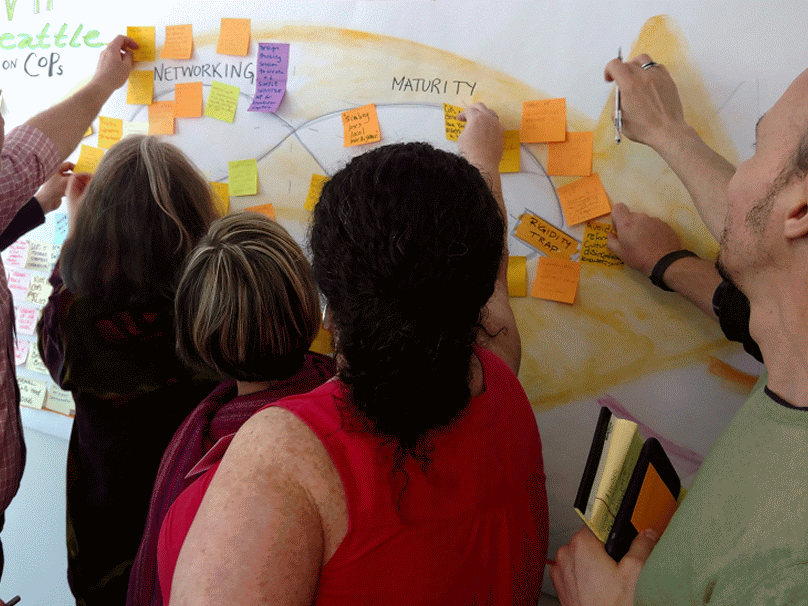In strolling through the archives of unpublished blogs posts, I came upon one which was simply a link to a great blog post from the Interaction Institute in 2017. And boom, it is still resonant today.

The wonderful author, Curtis Ogden, offered 10 principles for thinking like a network. I want to pull out a few things in each one to share with folks in some projects I’m working on. So why not share it here too? This is dynamically incomplete… be forewarned!
The groups I have been and am working with are quite different in some ways. One is an internal organization. Another is a tripartite collaboration that is ready to grow into a network. A third is a group that has done amazing F2F training and capacity building and has had to regroup in a COVID-Virtual world. All three, however, are motivated to act their way into their purposes in new ways. So first is the mindset and practices. In a later blog post I want to explore snap-back, the falling back into our old ways of being and doing.
Curtis’ intro to the article is great context:
Over the past several years of supporting networks for social change, we at IISC have been constantly evolving our understanding of what is new and different when we call something a network, as opposed to a coalition, collaborative or alliance. On the surface, much can look the same, and one might also say that coalitions, collaboratives and alliances are simply different forms of networks. While this is true, it is also the case that not every collaborative form maximizes network effects, including small world reach, rapid dissemination, adaptability, resilience and system change. In this regard, experience shows that a big difference maker is when participants in a network (or an organization, for that matter) embrace new ways of seeing, thinking, and doing.
https://interactioninstitute.org/thinking-like-a-network-2-0/
I think we all confound different forms of collaboration, try to be all things to all people and then we are frustrated when our ambitions are cut short. Working in new ways requires two things: discernment about what is possible, and a repertoire to make the possible real. I think these principles from Curtis support both these things. I encourage you to read the original article, because below I’m short cutting into some specifics.
Adaptability instead of control
This shows up so strongly in “strategic planning.” We tend to equate a detailed, task descriptive plan as a proxy for strategic action, especially in grand funded projects where plans, and executing on the plans, are key points for accountability. Yet, most work these days is in complex and changing contexts. Can we shift to adaptive planning which defines the purpose, direction and then iterates forward with strong accountability during, not just at the end?
Contribution before credentials
Equity has been in so many conversations. What seems to constantly block equity and its precursor, access, is that we continue to worship at the alter of credentialed expertise, rather than tapping all kinds of expertise. Whoops, look at the word “tapping!” We have extractive approaches to knowledge generation. How do we move to more contribution versus extraction that honors all, regardless of the title certain parts of society wish to attach to some and not others?
Giving first, not taking
See above about extractive mindsets!
Resilience and redundancy instead of rock-stardom
See above regarding stepping away from single views of expertise for the rock stardom stuff, but the resilience and redundancy needs a post of its own. The practice-based approach I’ve been working on for this is that we backfill for each other across departments, organizations, networks. No one these days can afford to hire all the skills they need at any one time. Trading labor across our networks builds redundancy and a sense of mutual support. There is a limit to this — we can’t keep ADDING work without taking something away.
Diversity and divergence rather than the usual suspects and forced agreement
This is why we work in networks!
Intricacy and flow not bottlenecks and hoarding
I struggled with this one until I went back and read Curtis’ words on this one. The word that emerges for me is abundance. (In all senses of the word, including mindset.)
I’m running out of steam, so I’ll leave the last four for YOU to flesh out, annotate, expound upon. If I leave this as a draft for another year… well, you know what happens!
Self-organization and emergence rather than permission and the pursuit of perfection
Shift focus from core to the periphery
From working in isolation to working with others and/or out loud
From “Who’s the Leader?” to “We’re the Leaders!”
I’d add leadership and power.
From a “career and fear” based power center to a “values and trust” based power center. The willingness to fall back on old, symbolic power tropes to force the appearance of progress and efficiency when exploration and empowerment are needed.
Yes, Ken, absolutely!